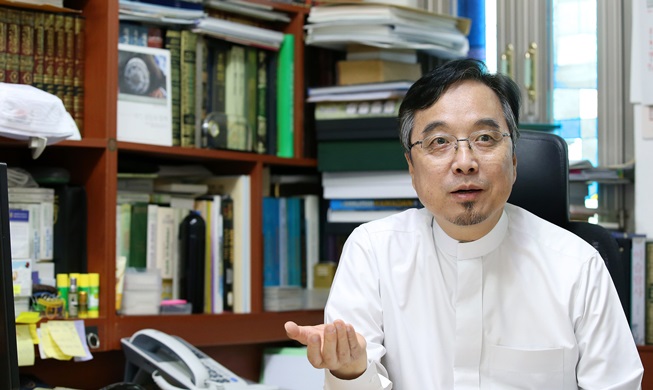
A. Rahman Lee Ju-Hwa, imam at the Korea Muslim Federation, speaks with Korea.net at the Seoul Central Mosque in Itaewon on Aug. 8. (Jeon Han)
By Kim Young Deok and Yoon Sojung
Aug. 8, 2017 | Seoul
"In the 1980s and 1990s, the religion of Islam could only really be found in Korea in the Seoul neighborhood of Itaewon. Now, however, we can find Islamic features and services at airports, terminals and rest areas,” said Imam A. Rahman Lee Ju-Hwa.
As the only ethnic Korean imam among Islamic leaders currently active in Korea, Lee said, “That is such an important change in Korean society.”
An imam is in a position of leadership in Islamic communities. The title refers to a worship leader of a community of Muslims.
During his years at university, Lee was chosen to study at the Islamic University of Medina as an invited scholarship student by the Saudi Arabian government. Thanks to that opportunity, he studied Arabic and Islam at that institution. Currently, he has been serving as the imam of the Korea Muslim Federation (KMF).
Korea.net recently sat down with Lee, who has been living as an ethnic Korean Muslim for about 30 years now. He talked about the changes that he has noticed across Korean society in regard to the acceptance of Islam, including the increasing number of facilities for Muslim tourists in Korea, such as halal restaurants, prayer areas and mosques.
- Please tell us about any changes you've seen in Korea, especially concerning halal restaurants, comparing the 1980s and today, and any future plans you may know of concerning halal restaurants.
There were two halal restaurants in Seoul 30 years ago. Since then, the number has gradually increased. However, observant Muslims only accept halal-certified restaurants. Considering this, I believe we need to have more halal-certified restaurants that receive such certifications from the KMF.
Regarding the halal certification, which the KMF has been providing since 1994, approximately 800 locations have been acknowledged as officially halal-certified locations, as of the first half of 2017. The number of certified places is on the rise. As the goal of the halal-certification process is to provide safe, verified and clean food for observant Muslims, the KFM aims to provide safe eateries for all Muslims, rather than simply focusing on profit. For this reason, we have been working hard on securing trust from inside the community but also expanding cooperation with world-leading halal certification authorities
- How about prayer areas for Muslims in Seoul?
Compared with the past, we have a lot more temporary musala, or prayer places, these days. There's a wonderful prayer hall on the third floor of the COEX convention center in Samseong-dong, southern Seoul. Such places can be also found at other spots frequently visited by Muslim travelers, like at Lotte World and at many markets. Among them, the most impressive one was at the Cheil General Hospital in Chunmuro, Seoul, as the hospital offers separate prayer halls for women and men, and each of them was accompanied by a wudu washing place, which is currently under construction. Muslim visitors can feel relieved and comfort thanks to such worship places.
Another exemplary case outside of Seoul is at Namiseom Island. The island used to take less care of its Muslim tourists, but now, due to the increase in Muslim visitors, there are halal restaurants and payer halls built there at the island.
- Along with these changes, have you noticed any increased interest in Islam in Korean society?
Since around 2000, it seems that Koreans have begun to understand Islam and Islamic culture a bit more, and I've traveled to many places across Korea to give lectures. Naturally, more people have begun to change their notions about Muslims. Although the number of new Islamic believers hasn't risen, people's notions about Islam here have been improved. For instance, improvements have been made in regard to certain misunderstandings about Islam, which regard it as a religion of violence, such as, “The Quran in one hand and a sword in the other.”
Although a small anti-Islamic community has formed, I also believe now's the time for Korean society to find ways to understand each other better and to live together.
- Is there any verse from Islamic scriptures that you would like to share with people here, a society that has undergone many changes?
There is a paragraph in the Quran that says that, “God’s ultimate goal in creating other tribes, men and women is to let them know more about each other.”
We should not only speak up about what we demand, but we should also acknowledge and accept others, as each of them exists for others. We can find different cultures, religions and different faiths across Korean society. I believe we should acknowledge the differences in order to exist together harmoniously.
kyd1991@korea.kr